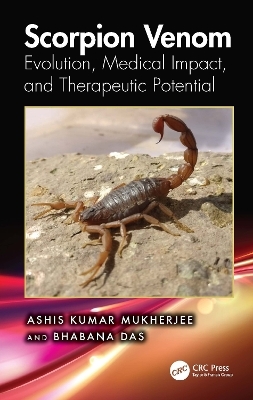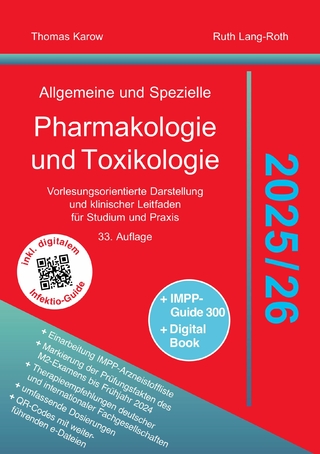
Scorpion Venom
CRC Press (Verlag)
978-1-032-89015-9 (ISBN)
- Lieferbar (Termin unbekannt)
- Versandkostenfrei
- Auch auf Rechnung
- Artikel merken
This book provides a comprehensive overview of scorpion biology and the medical implications of their venoms. It presents the taxonomic classification, anatomy, morphology, and natural habitats of scorpions, detailing their reproductive processes. It further explores the chemical nature of scorpion venom, discussing its composition, toxicity, and physiological effects, as well as its varied functions and mechanisms of action on ion channels. The chapter also focuses on scorpionism, presenting comprehensive epidemiological data and clinical insights from across the globe and reviewing the origin, evolution, and intricate composition of scorpion venom, framing its functional complexity and evolutionary significance. The book also covers the preventative measures and current treatment strategies for scorpion envenomation. It also addresses the limitations of existing antivenom therapies and examines innovative approaches, including the use of pharmaceuticals to enhance treatment protocols. The final chapter provides the promising biomedical applications of scorpion venom toxins across various medical fields. It discusses the therapeutic potential of these toxins in treating a range of human diseases, from cancer and cardiovascular diseases to autoimmune disorders and diabetes. This book is intended for researchers, clinicians, and students of toxicology, pharmacology, and arachnology.
Prof. Ashis K. Mukherjee, currently serving as the Director of the Institute of Advanced Study in Science and Technology (IASST), Guwahati, did an M. Sc. in Biochemistry from Banaras Hindu University in 1992, Ph.D. in 1998 on Indian cobra and Indian Russell’s viper venoms from the Dept. of Biochemistry, Burdwan Medical College, Burdwan University, and D. Sc. in Biotechnology from Calcutta University on snake venom phospholipase A2 and protease enzymes in 2017. He has over 30 years of research experience characterizing snake and scorpion venom toxins. His current research interest includes proteomic analysis of snake and scorpion venoms, pharmacological re-assessment of medicinal plants used against snakebite and scorpion stings treatment, quality assessment of commercial antivenom, and cardiovascular and anticancer drug discovery from natural resources, including snake and scorpion venoms. He has received several awards and medals for his academic and research achievements; the most notable is the Visitor’s Award for Research in Basic and Applied Sciences from the honourable President of India in 2018. He is a fellow of the Royal Society of Biology, UK, West Bengal Academy of Science and Technology, Kolkata, India, and Indian Academy of Science, Bangalore. Dr. Mukherjee has guided 15 research scholars for Ph.D. degrees and 40 M. Sc. dissertations and has published more than 155 research papers in peer-reviewed International and National journals, several book chapters, books, and review articles. He is also a DBT, ICMR, and WHO task force member on preventing and treating snakebite envenoming. Dr. Bhabana Das, currently serving as the Assistant Professor at the Department of Zoology in Devicharan Baruah Girls’ College, Jorhat, Assam (affiliated with Dibrugarh University), did an M. Sc. in Zoology from Gauhati University in 2018 and Ph.D. in scorpion venom at the Department of Molecular Biology and Biotechnology, Tezpur University in 2023. Her current research interests include proteomic analysis of scorpion venom, quality and safety assessment of commercial anti-scorpion-antivenom, and the discovery of a potent drug formulation for better treatment of scorpion stings.
Preface. Chapter 1. The Evolution, Diversity, and Geographical Distribution of Medically Significant Scorpions in the World. Chapter 2. Scorpions: Taxonomic Classification, Anatomy, Morphology, Habitat and Reproduction. Chapter 3. Scorpion Venom: Origin, Evolution, Composition, and Functions. Chapter 4. Scorpionism: Epidemiology, Pathophysiology, and Clinical Manifestations. Chapter 5. Scorpion Sting Envenomation: Prevention and Treatment. Chapter 6. Scorpion Venom Toxins: Biomedical and Therapeutic Applications
| Erscheinungsdatum | 18.12.2024 |
|---|---|
| Zusatzinfo | 6 Tables, black and white; 18 Line drawings, color; 6 Halftones, color; 24 Illustrations, color |
| Verlagsort | London |
| Sprache | englisch |
| Maße | 156 x 234 mm |
| Themenwelt | Studium ► 2. Studienabschnitt (Klinik) ► Pharmakologie / Toxikologie |
| Naturwissenschaften ► Biologie ► Biochemie | |
| Naturwissenschaften ► Biologie ► Zoologie | |
| Technik | |
| Weitere Fachgebiete ► Land- / Forstwirtschaft / Fischerei | |
| ISBN-10 | 1-032-89015-0 / 1032890150 |
| ISBN-13 | 978-1-032-89015-9 / 9781032890159 |
| Zustand | Neuware |
| Informationen gemäß Produktsicherheitsverordnung (GPSR) | |
| Haben Sie eine Frage zum Produkt? |
aus dem Bereich


